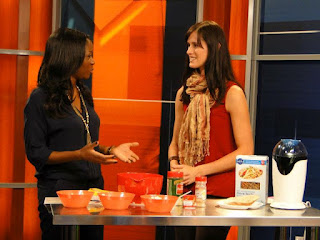Heading back to school is a great time to start thinking about building a new healthy habit. University freshmen may not have great cooking skills, understand portion sizes, or realize the importance of healthy and nutritious foods.
 Some of the challenges these students face include:
Some of the challenges these students face include:- no longer having access to home cooked meals
- increased freedom and independence over their food choices
- consumption of liquid calories (alcohol, specialty coffees, pop, etc.)
- food available at every turn (cafes, restaurants, fast food, convenience stores, vending machines)
- high stress levels (and potentially anxiety and homesickness) which can lead to emotional eating
- decreased sleep (which can increase appetite and allow you more hours to eat)
- decreased physical activity
- a lack of cooking or food preparation skills
- eating out more often (less control over what's in your food)
- trying to eat on a tight budget
- munching while late night studying or socializing
- skipping meals (and overindulging later)
When cooking for yourself it's great to have creative ways to use leftovers so that you don't feel like you're always eating the same thing. This is also budget friendly and saves time.
- rice - eat it hot, have it in a wrap, have it in a salad, or add it to soup
- pasta - have it hot, have it in a salad
- veggies - have them hot, have them with eggs as a frittata, have them in a salad or wrap
 Still looking for a study snack? Air-popped or microwave popcorn is a great way to get crunch. A cup of popcorn is only about 30 Calories (vs 160 for potato chips). Plus popcorn contains fibre, is a whole grain, and contains antioxidants (including some polyphenols not found in other vegetables and fruit). Don't have an air popper? Place 3-4 Tbsp of kernels in a brown paper bag, fold twice to seal and microwave for 1.5-2 minutes (depending on your microwave) until the popping slows. Loads of butter and salt can negate the health benefits, so have fun with different herbs, spices, and seasonings (garlic powder, Parmesan cheese, cocoa powder, cinnamon, etc.) . Plus remember to take a mental break from studying by being active and getting sleep.
Still looking for a study snack? Air-popped or microwave popcorn is a great way to get crunch. A cup of popcorn is only about 30 Calories (vs 160 for potato chips). Plus popcorn contains fibre, is a whole grain, and contains antioxidants (including some polyphenols not found in other vegetables and fruit). Don't have an air popper? Place 3-4 Tbsp of kernels in a brown paper bag, fold twice to seal and microwave for 1.5-2 minutes (depending on your microwave) until the popping slows. Loads of butter and salt can negate the health benefits, so have fun with different herbs, spices, and seasonings (garlic powder, Parmesan cheese, cocoa powder, cinnamon, etc.) . Plus remember to take a mental break from studying by being active and getting sleep.Steph Langdon, RD
something nutrishus counselling & coaching
www.nutrishus.com
